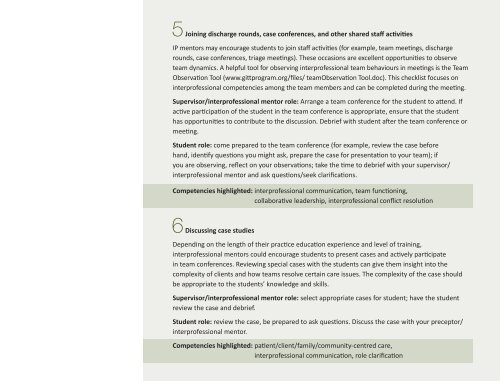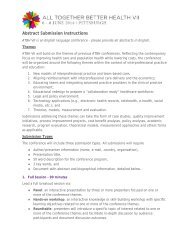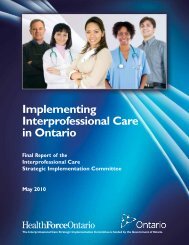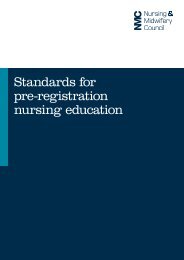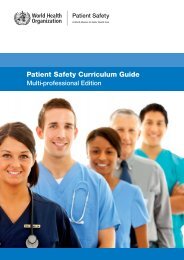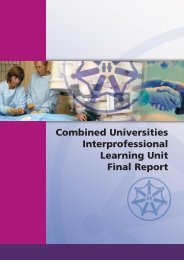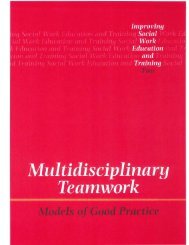Interprofessional Mentoring Guide - Alberta Health Services
Interprofessional Mentoring Guide - Alberta Health Services
Interprofessional Mentoring Guide - Alberta Health Services
You also want an ePaper? Increase the reach of your titles
YUMPU automatically turns print PDFs into web optimized ePapers that Google loves.
5 Joining discharge rounds, case conferences, and other shared staff activities<br />
IP mentors may encourage students to join staff activities (for example, team meetings, discharge<br />
rounds, case conferences, triage meetings). These occasions are excellent opportunities to observe<br />
team dynamics. A helpful tool for observing interprofessional team behaviours in meetings is the Team<br />
Observation Tool (www.gittprogram.org/files/ teamObservation Tool.doc). This checklist focuses on<br />
interprofessional competencies among the team members and can be completed during the meeting.<br />
Supervisor/interprofessional mentor role: Arrange a team conference for the student to attend. If<br />
active participation of the student in the team conference is appropriate, ensure that the student<br />
has opportunities to contribute to the discussion. Debrief with student after the team conference or<br />
meeting.<br />
Student role: come prepared to the team conference (for example, review the case before<br />
hand, identify questions you might ask, prepare the case for presentation to your team); if<br />
you are observing, reflect on your observations; take the time to debrief with your supervisor/<br />
interprofessional mentor and ask questions/seek clarifications.<br />
Competencies highlighted: interprofessional communication, team functioning,<br />
collaborative leadership, interprofessional conflict resolution<br />
6 Discussing case studies<br />
Depending on the length of their practice education experience and level of training,<br />
interprofessional mentors could encourage students to present cases and actively participate<br />
in team conferences. Reviewing special cases with the students can give them insight into the<br />
complexity of clients and how teams resolve certain care issues. The complexity of the case should<br />
be appropriate to the students’ knowledge and skills.<br />
Supervisor/interprofessional mentor role: select appropriate cases for student; have the student<br />
review the case and debrief.<br />
Student role: review the case, be prepared to ask questions. Discuss the case with your preceptor/<br />
interprofessional mentor.<br />
Competencies highlighted: patient/client/family/community-centred care,<br />
interprofessional communication, role clarification<br />
7 Conducting a collaborative project<br />
The interprofessional mentor may ask one or more students to conduct a small project. This might<br />
involve newly developing or updating some program information or education materials for patients<br />
or researching some treatment aspects. If more than one student is on site, they could collaborate<br />
on this project.<br />
Supervisor/interprofessional mentor role: in conjunction with the team, help the student(s)<br />
to identify an appropriate project. Ensure that the project has an interprofessional focus (for<br />
example, provides opportunities to address different professional perspectives or incorporate<br />
interprofessional competencies).<br />
Student role: In collaboration with your preceptor/interprofessional mentor and the team, identify<br />
a project of interest with an interprofessional focus. Work with another student (if available) on the<br />
project and be prepared to present the project to the team.<br />
Competencies highlighted: interprofessional communication, team functioning<br />
8 Connecting with community partners<br />
A number of partners may play a role in a patient’s care. It will be valuable for students to meet with<br />
these community partners to better understand the concept of continuity of care.<br />
Supervisor/interprofessional mentor role: Help your student to connect with one of the agencies/<br />
partners in the community you frequently collaborate and arrange for the student to spend some<br />
time with the partner. Discuss with the student what the goal for the meeting should be and how to<br />
prepare for it. Debrief with the student about the experience.<br />
Student role: Discuss with your supervisor/interprofessional mentor what agency or partner<br />
you would like to connect. Think about what kind of questions you have for the partner. You may<br />
consider conducting a brief interview with the partner. Plan the questions carefully and ensure<br />
that you take an interprofessional focus. Discuss your learnings or emerging questions with your<br />
supervisor or interprofessional mentor.<br />
Competencies highlighted: interprofessional communication, role clarification, team functioning


